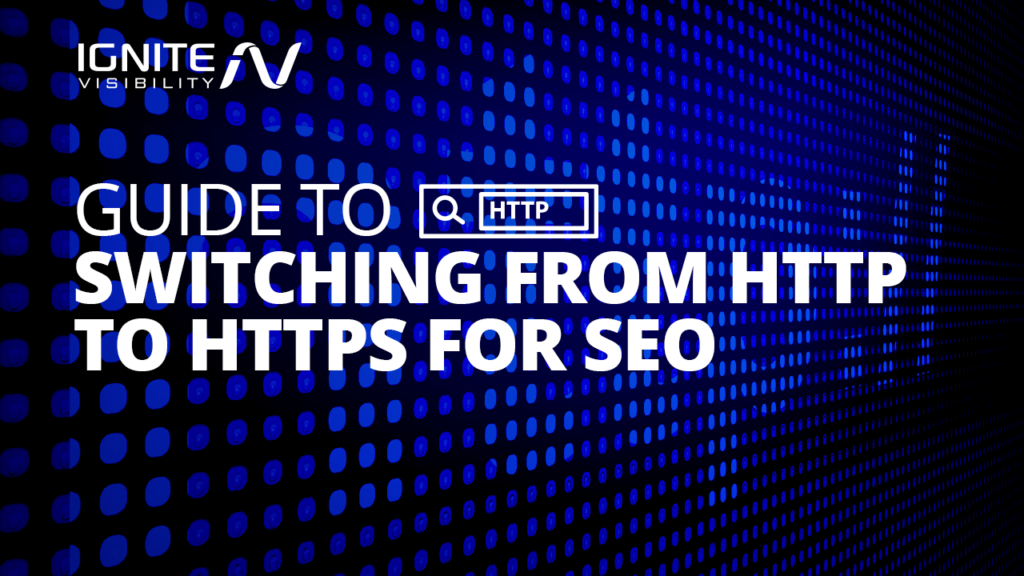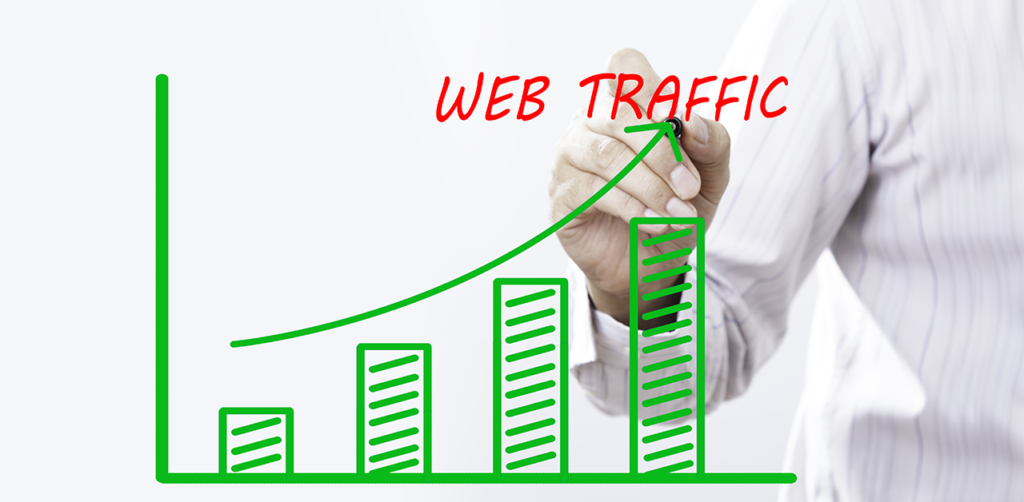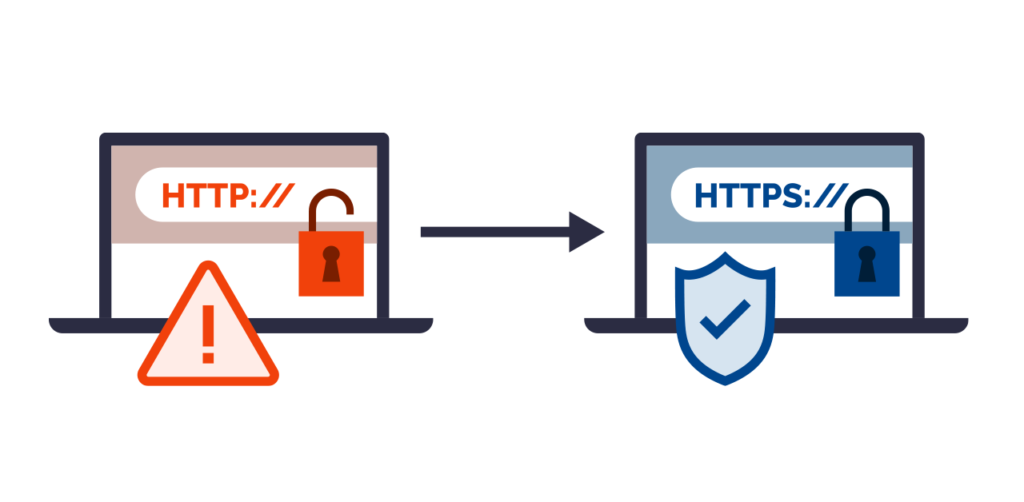Updated 3/4/2021
A handful of years ago, Google announced a lightweight ranking signal within their Google Search algorithm. The HTTPS/SSL ranking signal is said to only impact an estimated two percent of global searches, but Google says they may strengthen the HTTPS signal overtime to allow webmasters an adequate amount of time to migrate their websites from HTTP to HTTPS.
Google’s new process of buying and installing an SSL certification is an effort to push improved online security and will continue to play an important role in SEO; however, it is not going to be an instant fix for improved ranking. The HTTPS signal will aid as a ranking factor by improving relevancy and ranking of search results.

Guide to Switching from HTTP to HTTPS for SEO
With another Google recommendation to keep up with, webmasters are wondering how switching from HTTP to HTTPS is going to change a site’s SEO. In all honesty, it won’t impact onsite SEO directly, but instead increase the strength of a site’s URL, which will play a small (but potentially pivotal) role in a site’s ranking.
Google has openly admitted for a few years now that they will give a ranking boost to SSL sites, further encouraging webmasters to make the switch now to gain a tiny boost.
Switching from HTTP to HTTPS: What You Will Learn
-
What Is HTTPS/SSL?
-
Should I Switch to HTTPS for SEO?
-
How Do I Migrate My URL to HTTPS?
-
One-Click Conversion to HTTPS with WordPress 5.7
-
Is There Anything I Should Be Concerned About When Switching from HTTP to HTTPS?
-
What You’ll Need to Make the Switch
-
FAQ About the HTTP to HTTPS Transition
Watch a Video on Switching to HTTPS
What Is HTTPS/SSL?
HTTPS (Hyper Text Transfer Protocol Secure) is a secure version of HTTP that’s commonly used on ecommerce transaction sites, such as email applications, online checkouts, and online banking. Essentially, when a user connects to a website via HTTPS, the website then encrypts the sessions with a SSL (Secure Sockets Layer) Certificate. A user is able to detect the added layer of security as the URL will begin with HTTPS instead of HTTP or the locked pad lock icon will appear next to the URL, as with FireFox and Google Chrome.
The SSL certificate functions as small data files that hold a cryptographic key digital bind; thus, providing a secure connection between the web server and the browser. This stops data from being transferred to anyone who may be snooping. Prior to Google’s latest announcement, as many as 10 percent of all websites used HTTPS, but that number is growing in light of the new HTTPS recommendation.
Should I Switch to HTTPS for SEO?
Switching your website to HTTPS will not skyrocket your site to the top of the search results for your targeted keywords; however, it does appear to be the wave of the future as Google strives to provide a secure browsing experience. Migrating your URL to HTTPS/SSL is not a key priority or a single factor that will boost your ranking, but website owners need to prepare now as there will be a massive shift towards HTTPS, especially after Google’s endorsement. In terms of Google weeding through spammy and low quality sites, by switching your URL your site will gain credibility and your URL will have added juice behind it, ultimately resulting in a higher ranking.
How Do I Migrate My URL to HTTPS?
It’s not uncommon for some websites to already have SSL enabled on certain pages of a website, such as checkout areas. But, keep in mind that your page ranking increase will only be applied to the pages that have SSL enabled. Therefore, you need your entire website to be moved to HTTPS in order for your site to benefit from a full ranking boost.

Increase Page Rankings on Sites with SSL Enabled
To begin migrating your URL, you’ll need an SSL certification if you don’t already have one. You’ll need to decide if you need a single, multiple-domain, or wildcard certification. It’s best to use 2048-bit key certificate.
Next, use relative URLs for resources that reside on the same domain that’s secured. You will also use the protocol relative URLs for all of your domains. You’ll need to change your website’s address with the Change of Address Tool as stated by Google. Although, be aware you can’t currently change your URL to HTTPS from within Google Webmaster Tools as the capability isn’t there. Google is aware of this issue as is working on it.
When changing your URL, be sure your HTTPS site isn’t blocked from crawling with robots.txt. Also, allow indexing of your pages by search engines; however, avoid the noindex robots meta tag. During the entire migration process, track your migration with analytics software and Google Webmasters.
One-Click Conversion to HTTPS with WordPress 5.7
If you’re running a WordPress website and still using the insecure HTTP protocol, I have some good news for you.
WordPress 5.7 (or “Esperanza”) enables you to convert to HTTPS with just a single click.
And it’s available right now.
You might have struggled in the past with migrating to HTTPS. That’s because it requires a bit of technical wizardry.
But no more. Now WordPress will do all the heavy lifting on your behalf.
The latest version also offers a more user-friendly editor, new default colors, a robots API, and lazy loading iFrames.
Is There Anything I Should Be Concerned About When Switching from HTTP to HTTPS?
There is no real downside to switching your URLs to HTTPS. Although there have been a handful of reports of a few websites suffering a decrease in traffic after migrating URLs, the drop in traffic is not related to the URL transfer. However, be aware that migrating your URL needs to be done correctly or you will suffer a decrease in traffic.
The biggest concern relating to HTTPS is the fact many feel the load speed is slower when compared to Http, but Google has been working on the issue and says they have resolved the speed problems. In addition, Google states moving your URL will not impact your SEO or ranking in any negative way if done correctly.
The bottom line remains, HTTPS is basically necessary right now and can cause a huge increase in ranking. By switching now you’ll be keeping up with the times and remain prepared for the future of querying.
Although many webmasters aren’t in favor of the switch, overtime, the migration will be more urgent. Currently, Google has yet to announce when ranking will be influenced by HTTPS to a further extent. In the meantime, change your URL to HTTPS, continue focusing on quality content, and build relevant inbound links so you’re fully prepared for the next round of algorithm updates.
What You’ll Need to Make the Switch
- A web server that supports SSL encryption.
- A Unique IP address to allow certification providers to provide a valid secure certificate.
- An SSL Certification from an SSL provider.

HTTP to HTTPS
Setting Up Your SSL
- Purchase an SSL certification to verify your business’s identity to allow a web server to establish a secure encryption when a visitor views your website.
- Install the certification on your web server. The installation process varies depending on the web server and type of certification you purchase.
- Identify the pages on your website that you would like to secure with the SSL certification. Don’t feel limited to only securing transaction pages or those that collect personal information.
- Test your website to ensure all pages are secure by using multiple types of browsers. If the “lock” appears by the browser, your connection is secure.
To-Do: Migrating Your Website
- Use Google’s Change of Address Tool to notify Google that your URL has changed.
- After you’ve tested your site, prepare URL mapping for the new URLs to their new format in order for Google to begin indexing the content under the new URL.
- Set up a new content management system.
- Transfer the downloads and images you host to inform Google of their new location.
- Establish robots.txt file for site control to notify Google of which areas to crawl.
- Configure the server to redirect the old URLs to the new URLs.
- Update all URL details with relative pathways.
- Resolve any redirect or merged content errors.
- Verify both the old and new destination sites with Webmaster Tools.
- Prepare for 301 redirects and test them to ensure they function correctly.
Helpful Tricks and Tips
- If you’ve recently purchased a new domain, clean up the old domain with manual actions and remove old URLs and links.
- Update Google Analytics with the new URL.
- Point to all web forms on the HTTPS server.
- Use relative paths to images on secure pages to prevent error messages when loading images.
- Don’t block HTTPS site from crawling with robots.txt.
- Ensure the content on your HTTP site and your HTTPS site are the same.
FAQs About the HTTP to HTTPS Transition
How Do I Change from HTTP to HTTPS For Free?
You can use tools like Cloudflare, which are free ways to acquire SSL certificates across server-side infrastructures and other non-server platforms. Cloudflare does have a paid option, but you don’t need it for this purpose.
Another option for free SSL certificates is Let’s Encrypt. Full transparency: Let’s Encrypt had a bit of a hiccup in March 2020, when an error in their open-source software caused them to revoke more than 3 million active SSL/TSL certificates. However, they generated new ones within 24 hours and haven’t had an issue like this since.
Is It a Good Idea to Redirect HTTP to HTTPS?
It’s important to have HTTPS, and not just because Google virtually requires it these days. However, that ugly X next to your site on the search engine results page is enough to make anyone want to transition. According to Web.dev, “HTTPS prevents intruders from being able to passively listen to communications between your websites and your users. One common misconception about HTTPS is that the only websites that need HTTPS are those that handle sensitive communications.”
You should definitely have a secure site, but there are things to note. Hackers can theoretically use a criminalized tool such as an SSL strip to interfere. However, this is much less likely in the modern era.
How Do I Force HTTPS?
You can force HTTPS using an .htaccess file. You can only do this after installing your SSL certificate. This allows you to perform a 301 redirect, which is just developer lingto for permanently redirecting an old URL to a new URL (like HTTP to HTTPS). There are also tools (i.e. Hostinger) that provide this service as a built-in feature in their software package.
Bottom line
This seasoned ranking signal will continue to develop in strength and popularity as increased internet security is a growing concern. Give your website visitors peace of mind while benefiting from a small ranking boost by making the switch from HTTP to HTTPS.